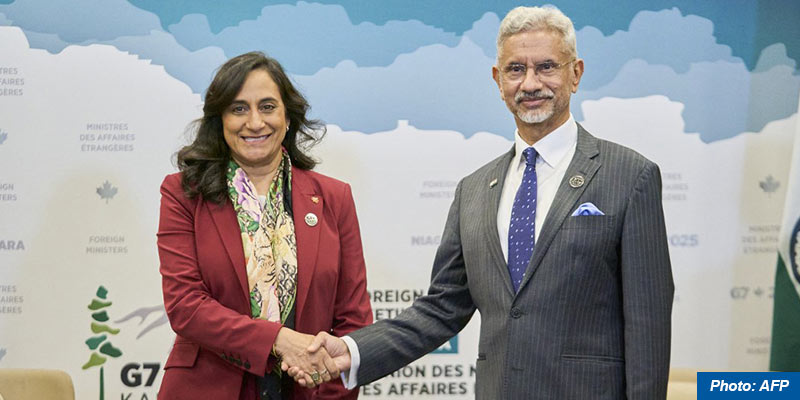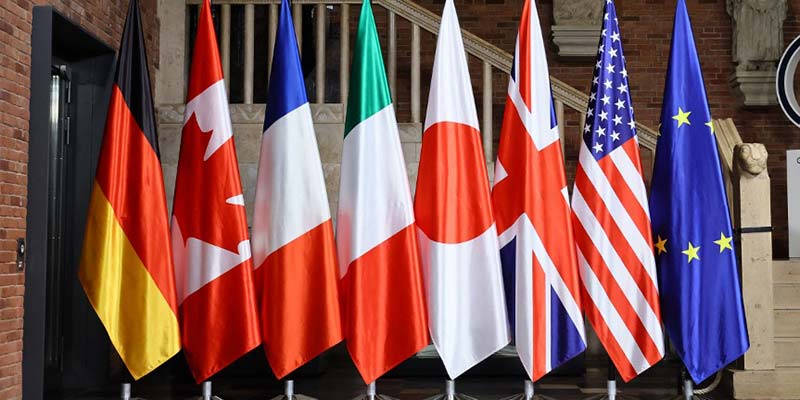- India
- Nov 12
Jaishankar attends G7 Foreign Ministers’ Meeting in Ontario
• Minister of External Affairs S. Jaishankar is participating in the G7 Foreign Ministers’ Meeting, which is being held in the Niagara Region, Ontario, from November 11 to 12.
• The year 2025 marks the 50th anniversary of the Group of Seven (G7).
• The G7 comprises the US, the UK, France, Italy, Germany, Canada and Japan.
• Apart from G7 Member States, diplomats from Australia, Brazil, Saudi Arabia, Mexico, South Korea, South Africa and Ukraine are participating in the meeting.
• The gathering provides an opportunity to advance Canada’s G7 agenda on pressing global economic and security challenges, including maritime security and prosperity, economic resilience, energy security and critical minerals.
• Jaishankar met with his Canadian counterpart Anita Anand on the sidelines of the event and said he looked forward to further rebuilding the bilateral partnership.
• Jaishankar's trip to Canada comes a month after Anand visited India during which both sides unveiled an ambitious roadmap to boost ties in areas of trade, critical minerals and energy.
What is Group of Seven (G7)?
• The G7 comprises the UK, Canada, France, Germany, Italy, Japan and the United States.
• It is the group of top seven developed economies.
• The Group was established as a platform for economic and financial cooperation in response to the 1973 energy crisis.
• The first Summit of Heads of State and government was held in November 1975 in Rambouillet, France. It included France, the United States of America, the United Kingdom, Germany, Japan, and Italy.
• In 1976, with the admission of Canada, the G7 took its current configuration. Since 1977, representatives of the European Economic Community, now the European Union, also participate in the work of the Group.
• Starting in the 1980s, the G7 expanded its focus to international security, human rights and global stability.
• Later, the G7 prioritised engagement with developing countries.
• The G7 has played a crucial role in strengthening international economic policies. It has advanced discussions on global issues such as climate change and gender equality, brought donors together and notably, supported disarmament programmes.
• The European Union is a ‘non-enumerated’ member and does not assume the rotating G7 presidency.
• The G7 expanded into the G8 between 1997 and 2013, with the inclusion of Russia.
• Russia was expelled from the G8 in 2014 when Barack Obama was US president, after Moscow annexed the Crimea region from Ukraine.
• The role as host, also known as the G7 presidency, rotates annually among member countries in the following order: France, United States, United Kingdom, Germany, Japan, Italy and Canada.
• The combined gross domestic product of G7 countries is about $40 trillion — a little less than half of the global economy.
• The annual G7 summits have over the years developed into a platform for determining the course of multilateral discourse and shaping political responses to global challenges.
• It complements the role of the G20, which is widely regarded as the framework for ongoing global economic coordination.
• It is capable of setting the global agenda, because decisions taken by these major economic powers have a real impact. The political direction set by these leaders on a policy issue will have a “ripple” effect across many other international organisations and institutions.
• Thus, decisions taken at the G7 are not legally binding, but exert strong political influence.
How does the G7 work?
• Compared to an international organisation, the G7 does not have a permanent administrative structure.
• Each year, starting from January 1, one of the Member States takes over the leadership of the Group on a rotating basis.
• The nation holding the presidency serves as a temporary secretariat and hosts the Group work and the Leaders’ Summit.
• Most importantly, the presidency plays a key role in setting the agenda and identifying key priorities.
• Canada assumed the presidency of the G7 on January 1, 2025.
• The Summit, the G7 Presidency’s centerpiece, is attended by the Heads of State and government of the seven Member States, representatives of the European Union, as well as States and international organisations invited by the presidency.
• The G7 Summit concludes with the adoption of a communique outlining important political commitments. These communiques — and more broadly the G7 decisions — have a significant influence on global governance and decision-making processes.
• The Summits are prepared by the Sherpas, who are personal representatives of the Heads of State and government. Sherpas are responsible for overseeing the negotiations and drafting the Group’s final communique.


